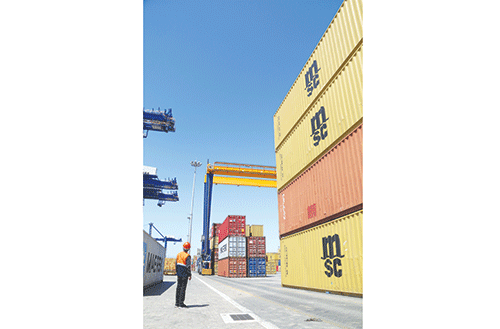WALVIS BAY – Negotiations for the management of the Port of Walvis Bay’s new N$4.2 billion container terminal seem to be nearing finality.
These negotiations with Terminal Investment Limited (TIL), owned by Mediterranean Shipping Company (MSC), a global leader in container shipping, is a move expected to significantly boost port capacity and thus revenue for the Namibia Ports Authority (Namport).
TIL, which handles at least 60 million container units annually and has interests in more than 60 terminals in over 30 countries on five continents, was awarded a concession in 2022 to manage Namport’s new container terminal for 25 years.
“The parties to the envisaged transaction, Namport and TIL remain seized with finalising the terms, conditions and all attendant schedules to the concession. We will, therefore, in due course, make the appropriate and necessary public pronouncements once the process has been completed,” stated Namport CEO Andrew Kanime.
He added that Namport appreciates the enquiries on the ongoing process of concessioning the new container terminal at the Port of Walvis Bay, and that the authority remains committed to transparently sharing information on the status and rationale for this strategic project.
However, TIL assuming control of running the new terminal has already experienced significant delays. Some private sector freight operators, including operators handling in-transit cargo at the harbour town, feel a well-connected entity such as TIL can adequately address the port’s capacity concerns.
Namport initially invested billions into the new container terminal to address capacity concerns of the old container terminal, which then stood at an annual throughput of 350 000 TEU’s (20-foot containers), nearing full utilisation. Now, with the new terminal, this capacity has been boosted to 750 000 TEUs.
Namport management feels the previous capacity situation was untenable.
“Suffice to say it created serious efficiency challenges, as containers had to be dug from the nearly full terminal. This gave impetus to the need to develop the new container terminal project, whose construction then commenced in May 2013, and was subsequently commissioned in August 2019,” said Kanime during a recent industry address.
Meanwhile, TIL has been granted the concession to run the new terminal due to its ability to generate sustainable volumes, and to help facilitate “organic growth” of transhipment and domestic volumes.
“The proposed concession, therefore, graciously represents a bold step by Namport and Namibia towards increasing the vessel calls through the port of Walvis Bay. While operators may initially focus on attracting transhipments to the terminal, the increased vessel calls will provide stability, certainty and capacity for growth of both local and regional cargo,” said Kanime at the time.
TIL Group
TIL was founded in 2000 by the Aponte family to secure container terminal capacity in major ports called by majority owner and main client, MSC.
“Securing increasingly restricted terminal capacity is critical to the development of MSC’s core container shipping business. TIL’s business model and strategy are closely related to those of our majority owner and main customer MSC, the world’s largest shipping line,” the TIL website reads.
“Our ability to leverage this commercial relationship with MSC has been a key driver of our rapid growth and success: predictable and growing level of throughput volume, long-term contractual arrangements which underpin revenue, de-risked growth, and capital investment decisions. TIL has a diverse portfolio of container terminals, strategically located at key ports on the world’s major shipping routes, providing access to key mature and developing markets,” it said.
TIL has a significant presence at some of the world’s busiest ports by container volume, including Singapore, Los Angeles, Rotterdam, Antwerp, New York and Valencia.
TIL has benefitted from a continued portfolio expansion over 20 years, adding two to three container terminal businesses on average per annum since 2000, through a combination of acquisitions, stake increases and greenfield developments.
Over the past 15 years, TIL’s average annual throughput growth rate of more than 10% has largely exceeded the industry’s average annual throughput growth rate by about 4% over the same period.
Despite the unprecedented disruption caused to global supply chains by Covid-19, the global diversity of TIL’s terminal operations and the stability of volumes supported through the affiliation with MSC, drove very strong 2020 results.
– ebrandt@nepc.com.na



